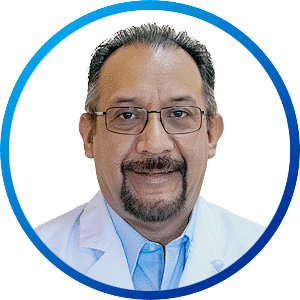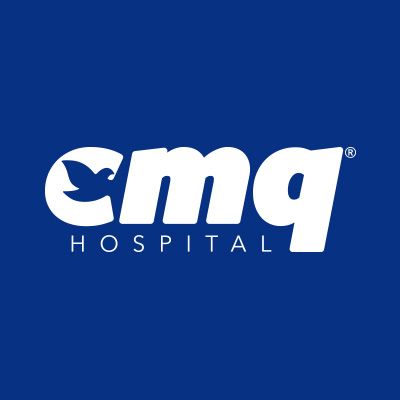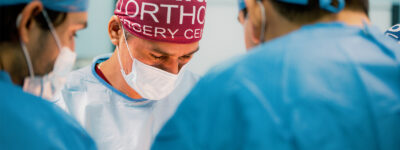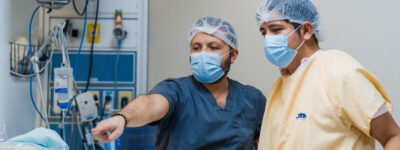A Colonoscopy in Puerto Vallarta, the Study that Can Save Your Life
What is a colonoscopy and what is the purpose of this study?
Are you interested in scheduling a colonoscopy study in Puerto Vallarta? Keep reading and learn more about this study that can save your life.
A colonoscopy observes the inside of the colon, the rectum, and the entire large intestine. It is an invasive study that is done under sedation. It is said to be invasive because the specialist inserts a small camera through the anus. A colonoscopy in Puerto Vallarta can help you detect the early signs of colon cancer, inflamed tissue, ulcers, and other issues. Also, this procedure helps doctors diagnose unexplained changes in bowel habits, abdominal pain, anal bleeding, and weight loss.
Generally, by protocol, everyone over 45 years of age should undergo this study, even if they do not have any symptoms, since this study can prevent colon cancer.
Dr. Carlos Olivares, General Surgeon, is an expert in Endoscopy and Colonoscopy in Puerto Vallarta.
Did you know?
Colon cancer is the second most deadly cancer in Mexico, only behind breast cancer. Every year, more than 15,000 new cases are detected.
According to our specialist, Dr. Carlos Olivares, this study should be performed once every five years. However, if abnormalities, such as ulcers, damaged tissues, or precancerous tissues are found, he recommends it every 2 to 3 years.
How to prepare for a colonoscopy exam?
The procedure consists of preparing the colon the day before the study, in order to clean the colon in its entirety. Likewise, this preparation begins by taking a laxative called Nulytely. This medication will help the patient to defecate constantly, and as a result, the colon and rectum will be cleaned for exploration the following day. Some of the tips that our colonoscopy expert in Puerto Vallarta gives us are:
- Do not ingest solid foods hours before your study.
- Stick to a liquid diet the day before your procedure.
- Follow your doctor’s instructions for laxative intake.
For a colonoscopy study to be optimal, the colon and rectum must be completely empty and clean. However, our expert comments that there are emergency occasions when the patient has rectal bleeding and the procedure is done without the previous cleansing. In this case, our specialists are in charge of cleaning the area.
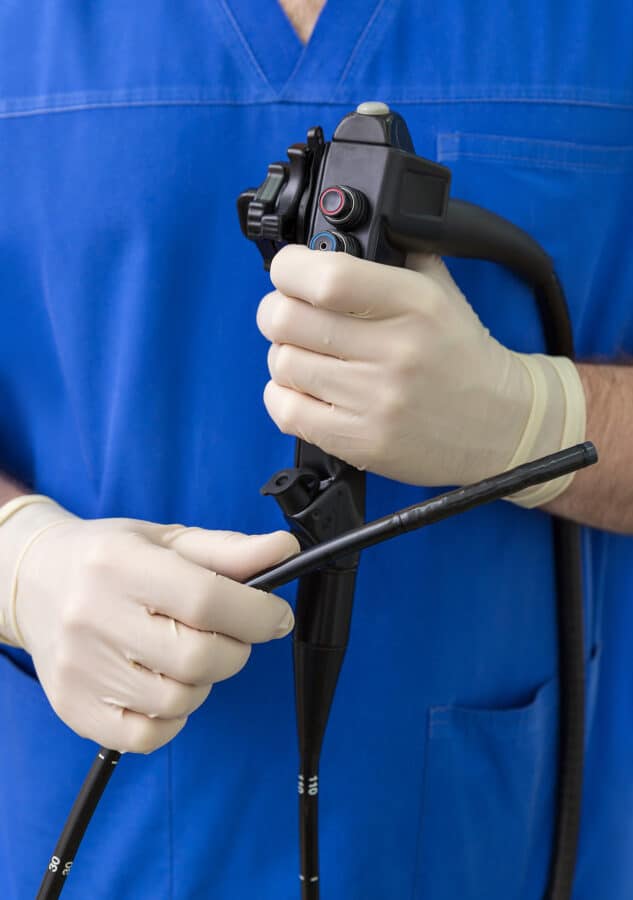
How is a colonoscopy performed?
For your comfort, the colonoscopy procedure uses sedation (anesthesia). On the day of the study, our medical team will administer medications intravenously through the arm. Likewise, we will be continuously monitoring your blood pressure, pulse, and oxygen. Afterward, once you are asleep, our expert will use an endoscope to examine your rectum and colon. The endoscope has a camera that will allow us to observe the colon mucosa, obtain biopsies of the area, and if necessary, remove polyps.
What are polyps and why is it important to study them?
Polyps are small protuberances that appear inside the large intestine. They are completely benign, 95% of the time. However, experts remove them and study them. Since they could cause colon cancer. Polyps can form by different factors, such as age, an inadequate diet, a sedentary lifestyle, and a family history of colon and/or uterine cancer.
During the colonoscopy procedure, you may experience some discomfort, a feeling of pressure in the area, or gas. However, you will not feel pain. A colonoscopy in Puerto Vallarta usually lasts between 20 to 60 minutes. The timing will depend on the findings and/or samples to be taken.
Endoscopy and colonoscopy, what is the difference?
An endoscopy is a procedure that studies the inside of the esophagus, stomach, and duodenum using an instrument called a camera endoscope. On the other hand, a colonoscopy uses the same equipment and technique, but in the rectum, colon, and large intestine. Another difference between the two studies is that endoscopy introduces the endoscope through the mouth, while colonoscopy is through the anus.
In the medical field, an endoscopy is a study that involves the use of a camera to observe the inside of the organs.
What to expect after a colonoscopy in Puerto Vallarta
When our specialist finishes the exploration, they will extract the endoscope and proceed with a light cleaning of the area. Afterward, it is possible that you may experience abdominal pain, pain in the area, and sometimes slight anal bleeding. However, you can expect a full recovery the day after the procedure. Similarly, you will be able to return to your usual diet and eat solid foods.
Regarding the results of your study, these will be available on the same day. In the event that a biopsy has been taken or tissue has been removed for further study, the results will be ready a few days later.
Schedule your colonoscopy in Puerto Vallarta!
The best colonoscopy specialists in Puerto Vallarta are at Hospital CMQ. Dr. Carlos Olivares is our expert in Colonoscopy and Upper and Therapeutic Digestive Endoscopy. Schedule your colonoscopy study in Puerto Vallarta by calling 322-226-6500.
You can also schedule your appointment with Dr. Carlos Olivares if you require an endoscopy.
Frequently Asked Questions about Colonoscopy in Puerto Vallarta
A colonoscopy can observe and study the large intestine. Likewise, it is a diagnostic study that helps to detect diseases like colon cancer.
The diseases that can be seen or detected through a colonoscopy are:
- Colon cancer
- Irritations of the colon mucosa
- Ulcerative colitis
- Crohn’s disease
- Diverticulitis
Most people should begin routine colonoscopy studies to detect early symptoms of cancer at age 45 or older. However, people with risk factors, such as a family history of colorectal cancer and/or inflammatory bowel disease, should perform colonoscopy studies before the age of 45. In general, our experts recommend this study every 5 years from the age of 45, or from the date of the first routine study.
Fortunately, a colonoscopy is generally not painful. During the colonoscopy procedure, it is possible that you may experience some discomfort or a feeling of pressure in the area. However, you should not feel pain. A colonoscopy in Puerto Vallarta uses sedation.
The day before your colonoscopy study, our experts recommend eating a liquid diet and ingesting the laxative recommended by your doctor. It is not advisable to eat foods that are high in fat, processed foods, foods with excessive coloring, or foods that are high in fiber. We recommend drinking plenty of clear liquids such as water, hydrating drinks, tea, and broth.

